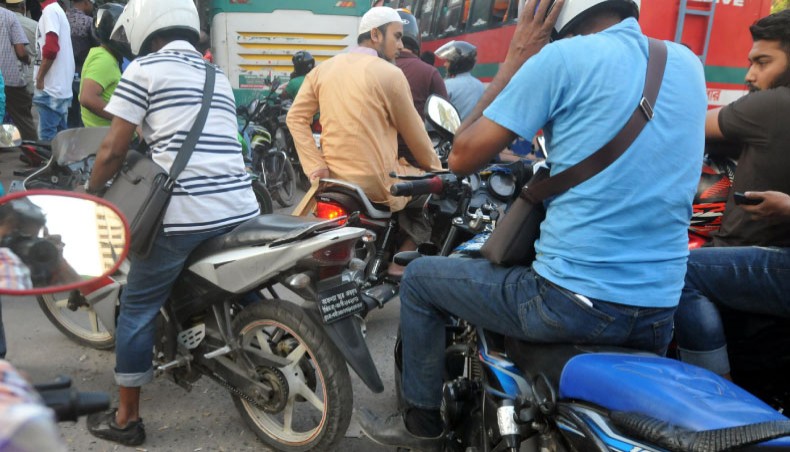RIDESHARING SERVICES Accidents on rise, guideline not implemented
An increasing number of fatal road accidents in Dhaka are being attributed to ridesharing services by experts because of poor safety gears, untrained and unskilled drivers and riders and lack of monitoring while their scope of operation across the country is expanding.
Despite increasing popularity, these app-based services, introduced in 2016, are still running without any government approval as a guideline, framed in 2018 allowing commercial use of private vehicles across the country, is yet to be implemented.
Users from time to time have complained about poor safety gears, especially those of motorbikes, considered to a major cause for fatal accidents.
They also allege that most of the drivers and riders under the services, especially the motorcyclists, are very unskilled in driving on busy roads of the capital and do not know the traffic rules.
Those of the drivers and riders who know traffic rules, many of them do not bother to follow the rules and drive recklessly, users companied.
All these are happening due to lack of monitoring by the authorities and the ridesharing service providing companies, observed experts.
According to the Bangladesh University of Engineering and Technology’s Accident Research Institute experts, the involvement of motorcyclists in road accidents increased recently.
Under the services, helmets provided for the pillion passengers are also not standard at all and that becomes a major concern for accidents, said the experts.
The drivers, especially the motorcyclists, drive recklessly to get more trips defying traffic signals and signs and overtake other vehicles which also increase the number of accidents, including fatal ones, they observed.
Assistant professor of the institute Kazi Md Shifun Newaz observed that the involvement of motorcyclists in road accidents increased in 2018 as ridesharing services saw a sharp rise in popularity.
That trend continued this year also, he said.
The expert said that currently many drivers and riders under ridesharing services remained untrained and even did not know the basic features of the vehicles, nor were they fully informed about the traffic rules.
The quality of the helmets in use by motorcycle service providers is also very poor and these services are also contributing to congestion as the use of vehicles multiplied, he observed.
The teacher urged the authorities to bring the ridesharing companies under registration immediately and impose a congestion charge on the vehicles under the services.
Work for a Better Bangladesh Trust programme manager Maruf Hossain said that motorcycles should be discouraged under the services as safety of the passengers and riders should be our top priority.
On April 25, Fahmida Haque Labannya, a 3rd year computer science and engineering student of BRAC University, died on the spot as a covered van hit the Uber motorcycle, which she was riding pillion, from behind near the gate of National Institute of Cardiovascular Diseases in Dhaka.
At a press conference on April 28, Dhaka Metropolitan Police blamed reckless driving of both the drivers for the fatal accident and also said that the ridesharing company, Uber, did not assist them instantly to locate the rider who provided fake address and information to the company.
Later, the police arrested the driver of the covered van and the rider of the motorbike.
On July 4, 2018, a pillion, Mohammad Nazmul Hasan Fuad, was killed and the biker was injured when a Bangladesh Road Transport Corporation bus hit their motorcycle on airport road in Dhaka.
The passenger of the ridesharing service, Pathao, was not wearing any helmet.
Users of the service also have complained about unprofessional attitude of drivers, high fare rate and also sexual harassment.
Commercial use of non-traditional transport services for Dhaka city passengers, involving private cars, motorcycles, CNG-run auto-rickshaws and microbuses, began to thrive in 2016.
The cabinet on January 15, 2018, approved the Ridesharing Service Guideline 2017, which came into effect on March 8 of the same year.
As per information provided by 16 ridesharing companies, currently 1,04,389 motorcycles, 18,253 cars, 73 microbuses, 54 ambulances and five jeeps are running under the services across the country.
On May 5, 2019, Bangladesh Road Transport Authority sent a letter to these companies expressing doubts over the number of vehicles running under the companies and asked them to send revised lists of the vehicles.
The numbers would be much higher, said the officials.
They also said that a number of conditions set down in the guideline necessitated the involvement of Bangladesh Police, Election Commission and road transport authority.
One of these conditions involves an SOS (Save our Souls) system in the application which will allow a button that would send information of the riders as well as passengers’ GPS (Global Positioning System) automatically to the national emergency helpline 999, while another involves an application through which an urgent signal would be sent to the police control room directly to protect users or riders from any threat.
In February, at a meeting, the authority decided to ban vehicles registered outside Dhaka from running on roads in the capital under the services.
BRTA director (engineering) Md Lokman Hossain Mollah said that for the safety of the passengers they had already asked the companies to provide training to the motorcyclists.
O Bhai Solutions Ltd and Sohoz Limited are following the instruction now, he said.
About the implementation of the guideline, he said that they were ready from their end while the other agencies were still working on fulfilling the conditions.
News Courtesy: www.newagebd.net











